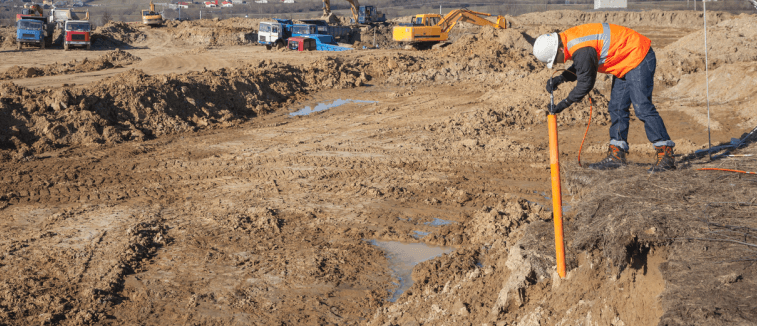Tailings Engineer: Crucial Proficiency for Sustainable Waste Management in Mining
Tailings Engineer: Crucial Proficiency for Sustainable Waste Management in Mining
Blog Article
The Interdisciplinary Approaches in the Geotechnical Industry: Connecting the Space In Between Design, Geology, and Environmental Scientific Research for Ideal Job Results
The integration of engineering, geology, and ecological science within the geotechnical industry is not simply advantageous; it is necessary for attaining ideal project outcomes. This interdisciplinary collaboration cultivates a comprehensive understanding of complex website problems, enabling cutting-edge options to emerge. By checking out key roles and successful study, we can reveal the vibrant interaction that drives job success. Difficulties continue to be in successfully taking care of these multidisciplinary initiatives, raising concerns regarding future trends and possible developments. What techniques might emerge to promote this crucial cooperation and boost the effectiveness of geotechnical techniques?
Significance of Interdisciplinary Collaboration
The significance of interdisciplinary partnership in the geotechnical sector can not be overstated. Effective geotechnical jobs need the combination of diverse know-how from different areas, consisting of design, geology, and environmental science. This collaboration makes sure that all elements of a task are considered, causing comprehensive solutions that address complex difficulties.
Interdisciplinary partnership fosters innovation by allowing professionals to share insights and techniques that may not appear when functioning in isolation (geotechnical engineers). By leveraging the staminas of several self-controls, groups can recognize possible threats, maximize style processes, and boost the sustainability of geotechnical projects. In addition, such partnership promotes an alternative understanding of site-specific conditions, which is important for precise evaluation and decision-making.
The intricacy of geotechnical projects requires a worked with approach to analytical. Inevitably, interdisciplinary cooperation is essential for progressing finest practices and accomplishing quality in the geotechnical industry.
Secret Duties of Each Discipline
Collaboration amongst numerous disciplines is not just helpful; it is vital for the successful implementation of geotechnical projects. Each technique-- engineering, geology, and ecological science-- plays a distinctive yet interconnected duty that adds to forecast efficiency and sustainability.
Geotechnical designers are primarily liable for designing structures and making certain architectural honesty. They assess soil and rock homes to evaluate load-bearing capabilities, supplying necessary data for secure building and construction methods. Their proficiency enables the solution of ingenious remedies to complex challenges.

Ecological scientists analyze the prospective influences of building and construction on ecosystems and water sources. They conduct ecological evaluations and create mitigation approaches to reduce unfavorable effects. By incorporating environmental factors to consider, they guarantee compliance with policies and promote sustainability throughout the task lifecycle.
Study of Effective Assimilation
Successful integration of geotechnical techniques can be exhibited via various case studies that highlight the efficiency of team effort in dealing with intricate engineering obstacles. One notable example is the building and construction of the Hong Kong-- Zhuhai-- Macau Bridge, where a collaborative method including geotechnical engineering, geology, and ecological science was crucial. Engineers and rock hounds worked in unison to evaluate the seabed conditions and maximize the foundation style, making certain stability and lessening ecological effect.
One more impactful instance is the improvement of slope security in the San Francisco Bay Area, where an interdisciplinary group integrated geotechnical evaluation with ecological analyses. By integrating geological surveys and hydrological research studies, the team efficiently identified prospective landslide threats and implemented effective reduction actions, enhancing safety and security and sustainability.
In addition, the redevelopment of Brownfield websites often requires a multidisciplinary strategy. In one case in Chicago, collaboration among geotechnical engineers, ecological researchers, and city planners resulted in the effective remediation of polluted soil, permitting the secure makeover of the site right into a neighborhood park. These instance studies show that interdisciplinary cooperation not just addresses technical obstacles but additionally cultivates ingenious remedies that benefit both jobs and neighborhoods.
Obstacles in Multidisciplinary Projects

Moreover, collaborating schedules and operations among numerous groups can be bothersome, especially when each self-control has special task landmarks and deliverables. This misalignment can my link lead to delays and increased expenses. The challenge of resource appropriation also impends big; making sure that specific proficiency is available at vital points calls for mindful preparation and foresight.
Lastly, regulative conformity postures another considerable difficulty. Each discipline may encounter various governing frameworks, and straightening these demands to meet job objectives can be time-consuming and complicated. Addressing these obstacles demands solid management and efficient interaction techniques to foster cooperation and ensure that multidisciplinary teams work cohesively towards shared goals.
Future Trends in Geotechnical Practices
As the geotechnical market evolves, arising trends are reshaping methods to resolve the difficulties faced in multidisciplinary tasks - geo tech engineer. One considerable fad is the raised assimilation of advanced technologies, such as expert system and artificial intelligence, into geotechnical evaluation and design. These innovations boost predictive modeling and threat assessment, enabling engineers to make even more educated decisions throughout the project lifecycle

Furthermore, the adoption of digital twins and real-time tracking systems is becoming more common. These tools promote continuous assessment of soil problems and structural efficiency, enabling prompt interventions when problems develop.
Final Thought
In final thought, the combination of engineering, geology, and ecological science is vital for attaining optimal results in the geotechnical sector. Successful situation research browse around these guys studies illustrate the advantages of this approach, while recognizing the challenges dealt with in multidisciplinary jobs.
The combination of design, geology, and environmental scientific research within the geotechnical market is not just advantageous; it is crucial for attaining optimum task results. Effective geotechnical tasks call for the combination of diverse know-how from numerous fields, consisting of design, geology, and ecological science.Browsing the complexities of multidisciplinary jobs in the geotechnical industry provides a number of significant challenges.As the geotechnical sector develops, arising fads are reshaping techniques to deal with the challenges faced in multidisciplinary jobs. Geotechnical engineers are significantly collaborating with ecological researchers her response to ensure that tasks align with sustainability goals and conform with regulatory demands.
Report this page